Skadi: Goddess Of Destruction, Giantess And Patron Of Winter Hunters And Skiers In Norse Mythology
A. Sutherland - AncientPages.com - In Norse mythology, Skadi (Skade) was the daughter of Thiazzi of the Hrimthurssar, the frost giant who inhabited Jotunheim. Skadi (also Skade) was the wife of Njord, the Vanir god of the seas, sailors, and fishermen. They all were enemies of the gods.
Skadi Hunting in the Mountains (1901) by H. L. M. Credit: Public Domain
In ancient Norse beliefs, the 'Hrimthurssar' giants had names: ice 'thiazzi,' frost 'thrym,' 'destruction skate, glacier' jokull, cold 'frosti,' and many others. They represented the changing seasons, the harshness of long winters of northern climates, and the coming of the eternal night and cold.
The Hrimthurssar were descendants of Ymir, the first great giant, formed from the ice and fire that existed at the beginning of time. Ymir represented, in part, the numbing cold of the Arctic region.
After Thiazzi, Skadi's father, died, she had to decide about her life. She went to Asgard, the home of the gods, to choose a husband. She and god Njord could not live happily together. Skadi did not like Noatun ('shipyard'), where god Njord lived. On the other hand, Njord did not like the severe cold of Thrymheim, which was Skadi's home. So they decided to separate.
In one story, 'Loki's Punishment,' the giantess Skadi placed a venomous serpent over the head of the trickster god, Loki. One myth says that this goddess symbolizes so extreme cold that she can be touched only briefly by the warm summer sun (Njord) and the trickster Loki's hearth fire.
 Skadi chose her husband by pointing to the feet that she liked best. Image credit: Anthony Mercatante
Skadi chose her husband by pointing to the feet that she liked best. Image credit: Anthony Mercatante
Why Did Skadi's Father Die?
Snorri Sturluson's Prose Edda explains that the gods killed Skadi's father after stealing the golden apples of Idun. When his daughter learned about his death, she was furious; equipped with her shining armor and weapon, and marched across Bifrost (the rainbow-like bridge leading from Midgard to Asgard) to face the gods responsible for her father's death.
It was forbidden to steal Idun's magic apples, which kept all the Asgard's gods young. After she arrived, they asked Skadi – according to the Norse custom - if she would take gold in payment for her father's death.
She explained that she owned all the gold she ever needed. When her grandfather Olvaldi died, he left much gold to his sons; one of them was her own father, Thiazzi; now she had this gold. Instead, Skaldi wanted to have a husband from among the gods.
Skadi married Niord. (W.Wägner (1882)
The gods agreed to the giantess' demand, but there was one condition: she had to choose her husband by pointing to the feet that she liked best, and so she did.
However, she also had one condition. The gods must make her laugh because she was still outraged. Laughing could make her frozen heart warmer.
The unusual deal was struck. The gods placed themselves behind a curtain, and only their feet were visible. Immediately, one pair of feet interested Skadi – the feet of the god Njord. So he took Skadi to his warm seashore home, but she did not like it. Njord, then, moved with her to Thrymheim, her cold, sunless world with constantly blowing wind, howling of the wolves, and severe cold.
To save their marriage, these two decided to spend nine days in Njord's world and nine in Skadi's. Skadi spent much more time in her cold world using her arrows to kill bears and wolves.
In "Ynglingasaga" of Snorre Sturlassons "Heimskringla," dated to 1230, it is said that the giantess Skadi could not live with Njord, so later, she married Odin, with whom she had many sons. One of them, Sæmingr, was the ancestor of the kings of Norway.
Snorri writes about Skadi, a jötunn and a "fair maiden":
"…The giant-queen of rock and snow,
Who loves to dwell on earth below,
The iron pine-tree's daughter, she
Sprung from the rocks that rib the sea,
To Odin bore full many a son,
Heroes of many a battle won…."
Written by – A. Sutherland AncientPages.com Staff Writer
Updated on January 2, 2023
Copyright © AncientPages.com All rights reserved. This material may not be published, broadcast, rewritten or redistributed in whole or part without the express written permission of AncientPages.com
More From Ancient Pages
-
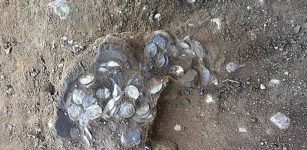 Viking Age silver coins unearthed in Jutland
Artifacts | Aug 27, 2015
Viking Age silver coins unearthed in Jutland
Artifacts | Aug 27, 2015 -
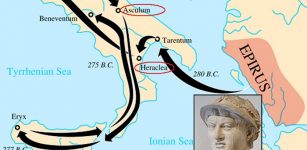 Where Does The Expression “Pyrrhic Victory” Come From?
Ancient History Facts | Apr 18, 2018
Where Does The Expression “Pyrrhic Victory” Come From?
Ancient History Facts | Apr 18, 2018 -
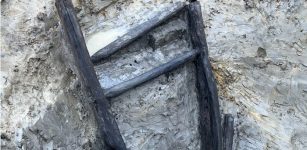 Incredibly Well-Preserved 1,000-Year-Old Wooden Ladder Discovered In The UK
Archaeology | Apr 30, 2022
Incredibly Well-Preserved 1,000-Year-Old Wooden Ladder Discovered In The UK
Archaeology | Apr 30, 2022 -
 Why Was Celebration Of Christmas, Easter, Midsummer And Saint’s Day Forbidden In Scotland?
Ancient History Facts | Dec 5, 2024
Why Was Celebration Of Christmas, Easter, Midsummer And Saint’s Day Forbidden In Scotland?
Ancient History Facts | Dec 5, 2024 -
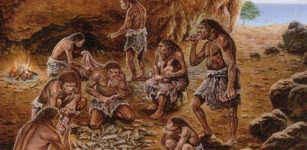 Groundbreaking Discovery Reveals High Cognitive Abilities In Humans Who Lived 170,000 Years Ago
Archaeology | Feb 7, 2022
Groundbreaking Discovery Reveals High Cognitive Abilities In Humans Who Lived 170,000 Years Ago
Archaeology | Feb 7, 2022 -
 Cremation In The Near East Dates Back To 7,000 B.C.
Archaeology | Aug 13, 2020
Cremation In The Near East Dates Back To 7,000 B.C.
Archaeology | Aug 13, 2020 -
 Goblins: Antisocial, Grotesque, Ugly And Vengeful Fairy Creatures In Ancient Beliefs
Featured Stories | Dec 6, 2018
Goblins: Antisocial, Grotesque, Ugly And Vengeful Fairy Creatures In Ancient Beliefs
Featured Stories | Dec 6, 2018 -
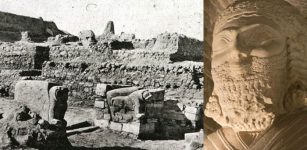 Arslantepe Mound – Home To The Oldest City-State Of Anatolia
Featured Stories | Jun 7, 2022
Arslantepe Mound – Home To The Oldest City-State Of Anatolia
Featured Stories | Jun 7, 2022 -
 How Ancient Cultures Explained Comets And Meteors
Archaeoastronomy | Jun 5, 2019
How Ancient Cultures Explained Comets And Meteors
Archaeoastronomy | Jun 5, 2019 -
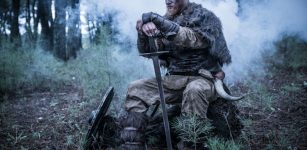 Vikings’ Self-Image Was Influenced By Ancient Rome – Intriguing Grave And Artifacts Reveal
Archaeology | Oct 18, 2022
Vikings’ Self-Image Was Influenced By Ancient Rome – Intriguing Grave And Artifacts Reveal
Archaeology | Oct 18, 2022 -
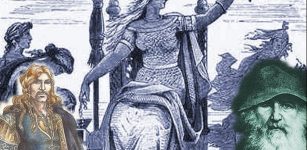 Frigg: Chief Norse Goddess Who Knew Secrets Of Humans’ Fates
Featured Stories | Dec 13, 2022
Frigg: Chief Norse Goddess Who Knew Secrets Of Humans’ Fates
Featured Stories | Dec 13, 2022 -
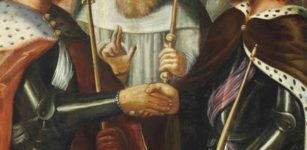 On This Day In History: Treaty Of Picquigny – Negotiations Between England And France – On Aug 29, 1475
News | Aug 29, 2017
On This Day In History: Treaty Of Picquigny – Negotiations Between England And France – On Aug 29, 1475
News | Aug 29, 2017 -
 Creepy And Unusual Ancient Skull Found In Small Crypt Investigated By Scientists But Can They Solve The Mystery?
Ancient Mysteries | Feb 2, 2025
Creepy And Unusual Ancient Skull Found In Small Crypt Investigated By Scientists But Can They Solve The Mystery?
Ancient Mysteries | Feb 2, 2025 -
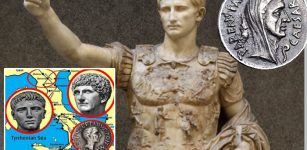 Triumvirates In Ancient Rome: Power Struggle, Intrigue And Ambush
Ancient History Facts | Apr 5, 2024
Triumvirates In Ancient Rome: Power Struggle, Intrigue And Ambush
Ancient History Facts | Apr 5, 2024 -
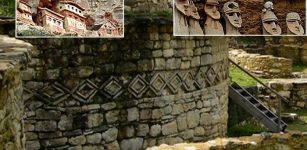 Mysterious Chachapoyas ‘Warriors Of The Clouds’ And Their Impressive Structures
Civilizations | Nov 4, 2020
Mysterious Chachapoyas ‘Warriors Of The Clouds’ And Their Impressive Structures
Civilizations | Nov 4, 2020 -
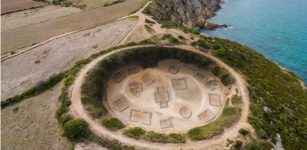 LIDAR Discovers Circular Iron Age Village At Cap d’Erquy, France
Archaeology | Apr 4, 2024
LIDAR Discovers Circular Iron Age Village At Cap d’Erquy, France
Archaeology | Apr 4, 2024 -
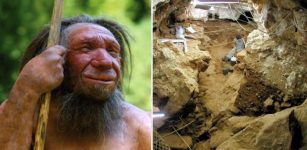 Neanderthal Intelligence Revealed By Their Use Of Fire For Cooking
Archaeology | Oct 13, 2023
Neanderthal Intelligence Revealed By Their Use Of Fire For Cooking
Archaeology | Oct 13, 2023 -
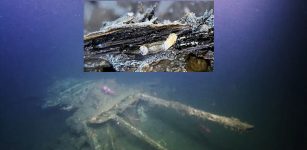 Could Shipworms Be Destroying The Wreck Of Captain Cook’s Endeavour?
Archaeology | Aug 18, 2022
Could Shipworms Be Destroying The Wreck Of Captain Cook’s Endeavour?
Archaeology | Aug 18, 2022 -
 Delatores – Who Were The Professional Gossip Collectors In Ancient Rome?
Featured Stories | Mar 21, 2025
Delatores – Who Were The Professional Gossip Collectors In Ancient Rome?
Featured Stories | Mar 21, 2025 -
 Beginning Of Fashion – Paleolithic Eyed Needles And Evolution Of Dress
Archaeology | Jun 29, 2024
Beginning Of Fashion – Paleolithic Eyed Needles And Evolution Of Dress
Archaeology | Jun 29, 2024


